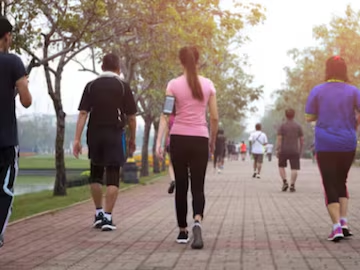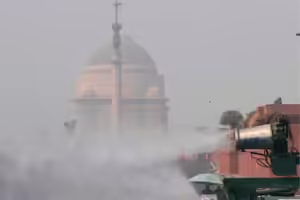Delhi Air Pollution: Avoid Early Morning Walks, Opt for These Timings Instead, Says Top Doctor

Amidst stubble burning in neighboring states, the air quality in Delhi-NCR is on a downward spiral, causing a significant rise in respiratory problems among residents just days before the Diwali festivities. Hospitals are reporting an increase in the number of patients seeking treatment for coughs and respiratory ailments attributed to the pollution.
It is currently being recommended by medical experts that individuals refrain from engaging in outdoor activities, such as morning and evening strolls, until pollution levels diminish and air quality enhances.
Should You Stop Early Morning Walks?
Dr. GC Khilnani, the head of Pulmonary, Critical Care, and Sleep Medicine at PSRI Hospital in New Delhi, has advised the residents of Delhi-NCR to refrain from venturing outdoors, particularly during the morning and evening hours, in order to reduce the detrimental effects of the polluted air.
Dr. Khilnani explains that during the early morning when wind is lacking, particulate matter tends to settle near the ground. Consequently, individuals engaging in early morning walks inadvertently breathe in densely concentrated pollution rather than fresh air. Furthermore, the heightened need for oxygen during morning physical activity prompts individuals to inhale more deeply, consequently elevating their exposure to pollutants. As a result, these detrimental particles and carbon penetrate the respiratory system and bloodstream, presenting notable health hazards.
Are Night Walks an Option Then?
Avoiding evening strolls is also recommended by Dr. Khilnani due to the decrease in temperatures at night causing the pollution to descend closer to the ground. This phenomenon promotes the generation of smog post 6-7 PM, laden with a substantial amount of contaminants and dust particles, thereby posing health risks to individuals taking evening walks.
Considered by the physician is the recommendation to restrict outdoor activities and to maintain closed doors and windows in the early morning and evening.
Dr. Khilnani suggests that individuals who are reluctant to skip their regular walks should consider doing so post-sunrise, as the sunlight can aid in dispersing the pollution. Typically, the air quality improves after 8-9 AM, rendering it a more favorable period for engaging in outdoor activities and workouts.
In several areas of the city, the air quality index (AQI) was classified as ‘very poor’ on Thursday, registering a reading of 328 at 9 am. The Central Pollution Control Board (CPCB) stated that the national capital was shrouded in thick smog in the morning.
The air quality is categorized into four distinct stages: Stage I, known as ‘Poor’ (AQI 201-300); Stage II, labeled ‘Very Poor’ (AQI 301-400); Stage III, denoted as ‘Severe’ (AQI 401-450); and Stage IV, identified as ‘Severe Plus’ (AQI>450).
In the national capital, 24 locations including Dwarka, Rohini, DTU, IGI Airport (T3), ITO, Mundka, Narela, Patparganj, Shadipur, Sonia Vihar, Wazirpur, Alipur, Ashok Vihar, Aya Nagar, Burari, Mandir Marg, Jawaharlal Nehru Stadium, Najafgarh, and Nehru Nagar experienced ‘very poor’ air quality on Wednesday and Thursday mornings.
In the winter season, Delhi faces high levels of pollution due to various factors like reduced wind speeds, decreasing temperatures, elevated moisture levels, and the existence of pollution particles that serve as condensation surfaces.
The decline in air quality within the country’s capital has led to a significant increase of 30-40 percent in respiratory problems, hitting children and the elderly the hardest.














